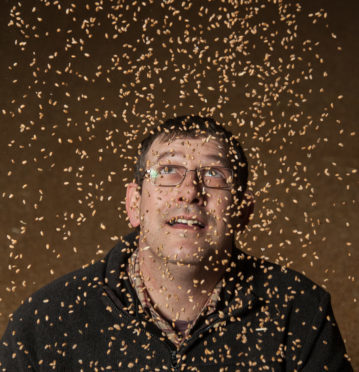A west Fife farm which achieved outstanding wheat yields in one of its worst-performing fields in 2017 has signed up to the Yield Enhancement Network (Yen) programme in a bid to match or even better its results.
Craig Norrie, the manager of Banchory Farm on the outskirts of Kirkcaldy, was in the combine last August when the yield meter showed his field of Zulu wheat yielding 7.13t/acre at 17% moisture, and he now aims to achieve the result again by paying
attention to every detail of the growing crop.
“We might never see that yield again but taking part in Yen will involve us monitoring everything, down to calibrating the combine before we cut the wheat and weighing the loads off the field so we can be precise and have proof of what we achieve,” he said.
“We’re also keen to share the story with the general public to show what farmers are doing to try to improve their businesses.”
Mr Norrie has already boosted yields on the farm’s 550 arable acres in the 12 years he has been managing the unit.
When he arrived in 2006, wheat was averaging 3.5t/acre, oilseed rape 1.4t/acre and malting barley 2t/acre.
Last year the wheat yield had risen to 4.75t/acre, oilseed rape to 2.1t/acre and malting barley to 2.6t/acre.
He describes the undulating medium to heavy land as “difficult” and far removed from the uniform flat acres in the east of the county, and he attributes much of the recent cropping success to soil testing and field mapping.
“We discovered in 2007 that the farm was low in lime, potash and phosphate and we put on 1,000 tonnes of lime in the first year and have been monitoring it every year since,” he said.
“We have also focused on the timing of fertilisers and sprays which is critical.
“Yields have gone up and we have noticed how even and balanced the crops are, even in fields with low dips and high patches of land.
“We have achieved a lot and we’re pleased with that but I’m now looking at what else we can do, and I’m keen to demonstrate to other growers what’s possible.”
Douglas Bonn, the local Nickerson specialist who supplies the wheat seed, pointed out there were huge gaps in yields between leading farms in the UK and average commercial producers.
He said: “The good producers are usually really interested in how they are getting their yields.
“Sunlight, rain and nutrition are the three things that drive yield and Yen looks at gaps of management which prevent growers getting optimal yield.”
A detailed soil analysis has been done on the crop under scrutiny, and dates of sowing, seed rate and emergence have all been noted.
Mr Norrie said everything had been looking promising – until recently.
He said: “We sowed the crop in October and it came through the winter very well but after this cold snap we feel it’s now starting to go backwards.
“It has run out of steam as there are no nutrients left and it needs nitrogen, but the land is too wet to get on.”
nnicolson@thecourier.co.uk










